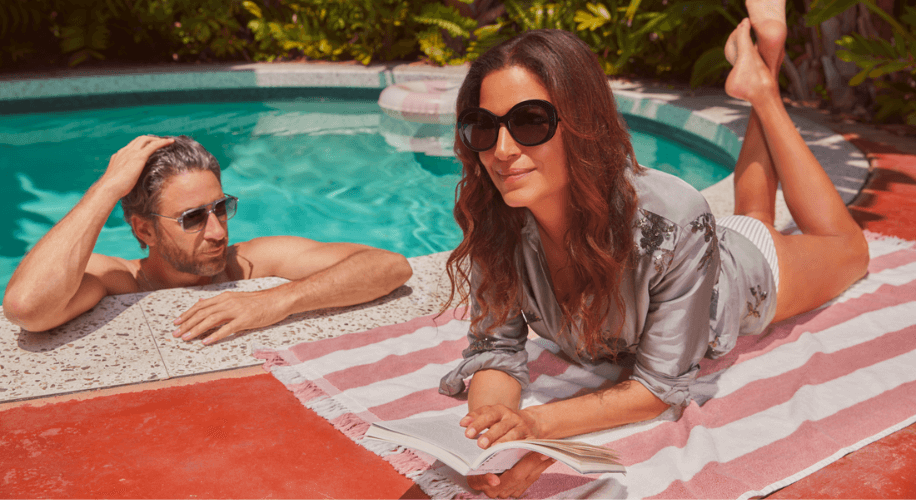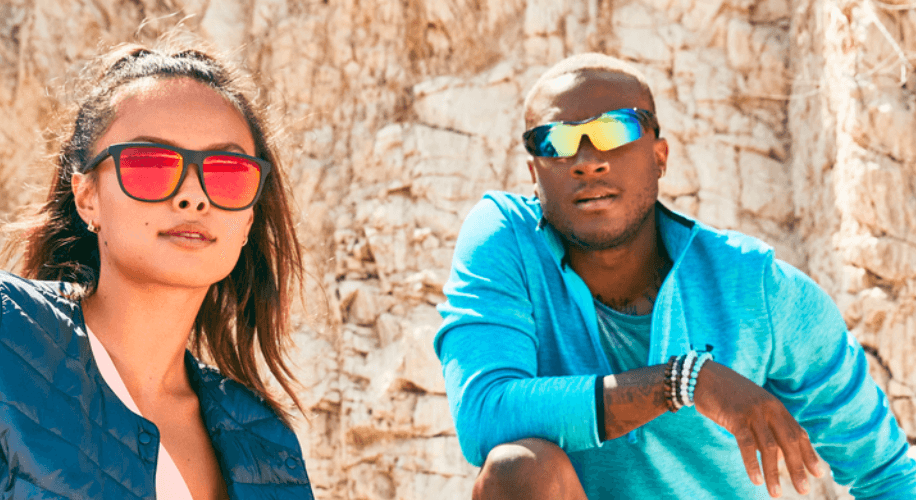Aging Gracefully: Protecting Your Eyes with UV-Blocking Sunglasses
The skin around your eyes is incredibly delicate and often the first to show signs of aging. But the effects of aging on your eyes go beyond wrinkles and sagging. Conditions like presbyopia, macular degeneration, and cataracts can also become concerns. As we age, our eyes face more challenges, making eye protection a crucial aspect of aging gracefully. It all starts with wearing sunglasses to shield your eyes from the harsh effects of UV rays.

Do I Need Sunglasses When It’s Not Sunny?
Absolutely. Harmful UV (ultraviolet) rays from the sun can penetrate clouds, putting your eyes at risk even on cloudy days. Sunglasses are essential for blocking UV rays and safeguarding your eyes.
Understanding UV (Ultraviolet) Rays
UV rays are a form of high-energy, invisible light. There are three types:
- UVA (Ultraviolet A): These rays have longer wavelengths and can penetrate glass and the skin’s outer layer, potentially damaging DNA.
- UVB (Ultraviolet B): UVB rays are the most dangerous, with less penetration but higher energy, necessitating sunglasses and sunscreen.
- UVC (Ultraviolet C): UVC rays are absorbed by the ozone layer and don’t reach the Earth’s surface.

When Are My Eyes at Risk from UV Rays?
While the sun is strongest from 10 a.m. to 2 p.m., UV radiation can harm your eyes at any time. Glare and reflections are also problematic, so wear sunglasses when in snowy, watery, or sandy environments, or while driving (windshields reflect glare).

How Can I Protect My Eyes from UV Damage?
The best protection against UV radiation is sunglasses that block 100% of UV rays. While some contact lenses offer UV protection, they can’t cover your entire eye, so sunglasses remain essential. Consider wraparound sunglasses for all-around UV protection.
Choosing the Right Sunglasses
Zenni Optical offers a range of sunglasses, including customizable prescription sunglasses. Simply provide your prescription, choose your preferred frame style, and select the lens type to create fashionable, high-quality sunglasses tailored to your needs.
- Polarized Sunglasses: These sunglasses enhance comfort by reducing glare from surfaces like water and roads.
- Anti-Reflective Coating (AR Coating): Sunglasses with AR coating minimize reflections from both the front and back lens surfaces.
- Mirrored Sunglasses: Not only do mirrored sunglasses shield your eyes from intense UV rays, but they also provide a stylish mirrored effect and tend to be darker.
- Gradient Tint Lenses: These lenses gradate from darker at the top to lighter at the bottom, ideal for driving as they block sunlight from above while keeping your dashboard visible.
- Photochromic Lenses: These lenses adapt to different lighting conditions, changing color based on light intensity. They’re perfect for both indoor and outdoor use, reducing the need for multiple pairs of glasses.
- Progressive Sunglasses: If you’re over 40 and experiencing presbyopia (difficulty focusing on close objects), progressive sunglasses can meet various vision needs for work and leisure allowing you to focus on the distance while driving and still be able to see your odometer clearly.

Choosing the Right Lens Color
The choice of lens color is a matter of personal preference and doesn’t affect UV protection. Neutral gray and brown are popular choices as they don’t distort colors. Athletes might prefer lenses that enhance color contrast, such as yellow lenses, which reduce glare and enhance clarity in low light conditions.

Do Sunglasses Need to Be Impact Resistant?
Opt for sunglasses with impact-resistant and scratch-resistant lenses for comfort and safety. Trivex lenses are an excellent choice because they are lightweight, highly impact-resistant, and have superior optical clarity.
Do Darker Sunglasses Provide Better UV Protection Than Lighter Ones?
Darker sunglasses reduce more visible light than lighter ones but don’t necessarily offer better UV protection. To ensure proper UV protection, always choose sunglasses that block 100% of UV rays, regardless of lens color.

Should Children Wear Sunglasses?
Absolutely. Children often spend more time outdoors than adults and have more sensitive eyes, putting them at greater risk. UV damage accumulates over a lifetime, so it’s crucial to start protecting your child’s eyes early on.

Your eyes are precious, and safeguarding them from UV damage is vital for maintaining good eye health. Whether it’s bright and sunny or overcast, make sunglasses a daily habit. At Zenni Optical, you can find the perfect pair to match your style while ensuring long-term eye protection.
About the Author: Dr. Steven Lee
Dr. Steven Lee is a visionary leader in the eye care and telemedicine sectors and has built a remarkable career by combining his formal training in eye care, engineering expertise, and a passion for innovation. Dr. Lee serves as Zenni’s the Head of Optical Product.


 Canada
Canada